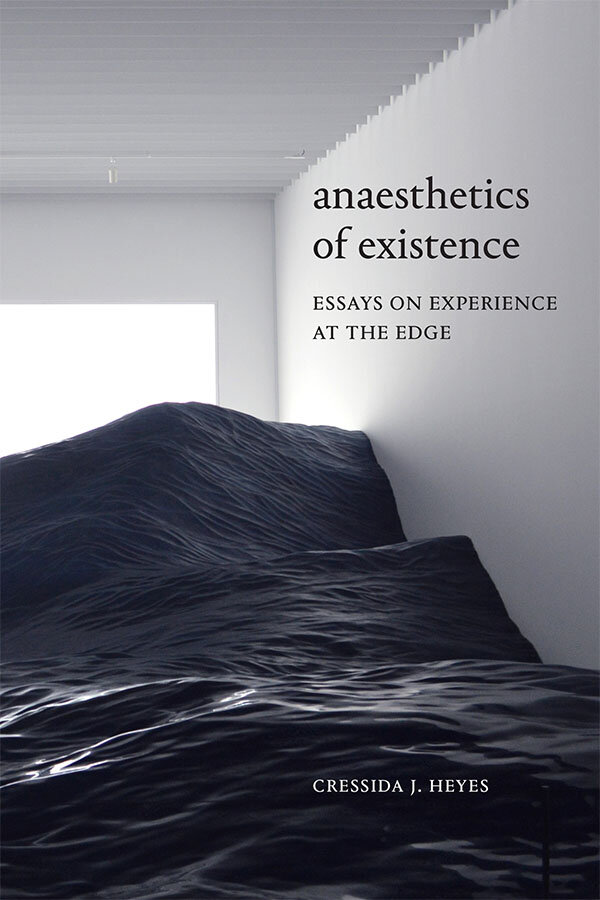Anaesthetic time, pandemic redux
Anaesthetics of Existence: Essays on Experience at the Edge isn’t about any single topic. It makes a case that “experience” is a social and political category, and so some things we undergo do not get included. By examining those “edges” to experience—our lives as unconscious subjects, or subjects outside normative regimes of time, or subjects whose subjectivity is fractured rather than consolidated by what happens to us—it tries to revivify debates about how “the personal is political.”
It came out with Duke in early May, as pandemic lockdown had settled into place and even the immediate future was radically uncertain. I joked uneasily that I had published a book about checking out just as it became mandatory. Those of us in white-collar jobs who had “pivoted” to working from home while we simultaneously supervised online schooling for kids found ourselves trapped in small spaces for long periods of time, doing the same things with the same people, all on a screen. Others—from librarians to wait-staff—were abruptly furloughed or laid off, and found their anxiety increasing as the pace of life slowed. Wage-workers in industries suddenly labelled “essential,” by contrast, were still showing up for their jobs as grocery clerks, delivery drivers, hospital cleaners, or care assistants, dealing with studied indifference to health risks, staff turnover, and unpredictable shifts. Terrifying news stories emerged about doctors and nurses in northern Italy or New York City who were working as continuously as humanly possible, refusing themselves sleep, as they grappled with monstrous ethical challenges about whom to ventilate, or the organizational nightmares of massively increased nurse-to-patient ratios in ICUs.
Everyone’s experience of time changed.
In my book I argue that “anaesthetic time” is that diffuse, unpunctuated, and inattentive temporality that characterizes a certain kind of relaxation or down-time, typically experienced in the late evening, after the kids have gone to bed, especially for parents in day-jobs with regular weekday schedules. I suggest that the marketing of cheap, sweet alcohol to “moms who need wine” is a way of exploiting this need for a temporal experience antithetical to the scheduled, productive, multitasking, flexible-for-others “postdisciplinary” time of paid work and domestic labour. These two experiences of time are flip sides of the same coin. For those of us who work in this temporal economy, they sustain each other, and are carefully cultivated by various vested interests and sometimes by our own work ethic. If we are wage slaves, we might be able to resist, but we can’t simply opt out.
In some ways, the pandemic time of those of us privileged enough to be locked down in our homes is a strange combination of mutated postdisciplinary time and anaesthetic time, without the clarity of their juxtaposition that makes them part of a meaningful temporal system. Some of us are overwhelmed with constant online meetings and “Zoom fatigue,” while others are lost without the punctuation of arriving at work and leaving, grocery shopping and other errands, going to the gym, dropping the kids at daycare, or whatever temporal habits form the grammar of our lives. At the start, some spoke of time moving grindingly slowly. As the millennial meme had it, “I’ve lived through four decades: the 1990s, 2000s, 2010s, and March 2020.” As the summer has flown by, other have noted that time speeds up when it is flat and monotonous, no longer pleasurably interrupted by vacations, summer arts festivals, or community barbecues. It is hard to remember when, exactly, trivial things happened, or to put everyday events in temporal order.
No wonder that as the temporal disruption continues, many people chafe at the idea that they should work but not play. “Opening the economy” is government code for providing survival income for millions of people who might otherwise have been seeking out loan sharks and waiting in line at the food bank. But it also means an uptick in work that recreates postdisciplinary time: the delivery trucks and gig service vehicles that zip around my urban neighbourhood have multiplied; the increasingly shrill memos and finger-wagging webinars about the need for university teachers to step up for a fall online started back in May; the moms who are supervising homeschool and bored kids while trying to sell mortgages via cellphone need more than wine. All this without a concomitant time out is not what any of us—especially, but not only, the middle-class and male “us”—were promised. This explains in part why public health pronouncements about the need to stay home, stay away from the bars and beaches, “stay alert” (as the UK government unhelpfully but tellingly advises), to stay sober in every sense are not compelling. A postdisciplinary time marked by constant vigilance is unendurable.
In her brilliant book Enduring Time, Lisa Baraitser makes sense of suspended time—“modes of waiting, staying delaying, enduring, persisting, repeating, maintaining, preserving, and remaining—that produce felt experiences of time not passing.” The pandemic has put many of us into suspended time, in one way or another, and revealed the extent to which the prior organization of work and leisure comprised a system in which the petty rewards of anaesthetic time were one of the things that kept it going. Baraitser suggests we rethink our cultural disrespect for enduring, with its associations with feminized care work, unskilled labour, or the lives of prisoners. In pandemic time, many of us are producing less, consuming less, travelling less, doing less of the things that feel most like doing. As my book argues, the privileging of certain kinds of agency that manifest through certain kinds of action is a political problem. This pandemic provides a painful and uneven opportunity to examine the temporal systems that give meaning to our experience and tell us what we are worth.
Read the introduction to Anaesthetics of Existence and save 30% on the book using the code E20HEYES.
